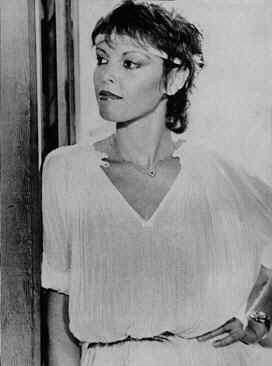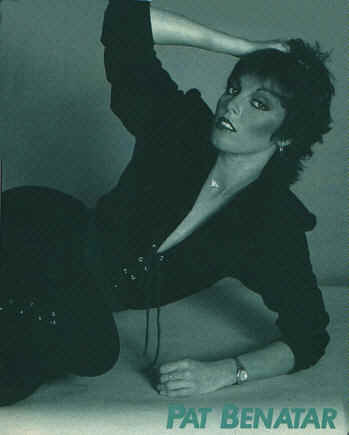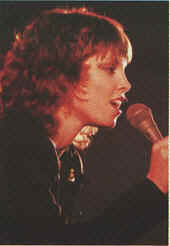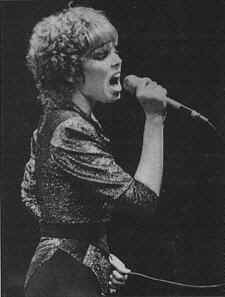 High Times: By
"attitude," do you mean sexuality?
High Times: By
"attitude," do you mean sexuality?PAT BENATAR: NOT JUST ANOTHER ONE-DIMENSIONAL COLD-HEARTED
BITCH
-Liz Derringer
 Benatar: Losing anonymity was the
biggest change. it was being recognized and having people come to your house and try and
steal things from your front yard that was hardest to get used to. Having people all of a
sudden want your physicalness, your watch, jewelry, hair---whatever. I remember the first
time I was recognized in California, where I live. I pulled up in the car, I wasn't
wearing makeup. I had sunglasses on and the store I was going to was near a high school
and the kids were getting out of school. I was in the store and there were forty kids
there also. I started to get nauseous. I started to get nervous and I said to one of the
kids, "How could you possibly know it was me?" He goes, "Your lips, your
lips, I'd know your lips anywhere." I knew this was over the edge.
Benatar: Losing anonymity was the
biggest change. it was being recognized and having people come to your house and try and
steal things from your front yard that was hardest to get used to. Having people all of a
sudden want your physicalness, your watch, jewelry, hair---whatever. I remember the first
time I was recognized in California, where I live. I pulled up in the car, I wasn't
wearing makeup. I had sunglasses on and the store I was going to was near a high school
and the kids were getting out of school. I was in the store and there were forty kids
there also. I started to get nauseous. I started to get nervous and I said to one of the
kids, "How could you possibly know it was me?" He goes, "Your lips, your
lips, I'd know your lips anywhere." I knew this was over the edge.
High Times: When did you first start singing?
Benatar: In school they find out when you're eight or so how much range you have or it you have a voice. They put me in choir when I was about twelve. I had a very big range for a kid my age so I received special treatment. My voice was so legit, I mean really classical, it was amazing, you wouldn't believe it. I was listening to the Beatles or the Rolling Stones and singing Puccini. My brother sounds like Pavarotti.
High Times: I read somewhere that when you first started out you didn't want to dress up in the black leotards that have since become your trademark. Is that true?
Benatar: It began as a Halloween joke, dressing in tights and boots. I was dressing up as this creature and I went on stage and sang. Because of the clothing, my attitude changed and the attitude went over so well that I said there must be something to this. So I tried it again. I was real timid about doing it but I kept on so I could get the attitude without the clothes. The clothes and the makeup is the release for me; it puts the other character out on stage 'cause the one sitting with you now is so different. This girl cannot rock. She gets up there and does sound check in sneakers and the voice comes out and it's the same voice but this girl is not rocking. As soon as I put the outfit on I get the attitude, I even stand different.
 High Times: By
"attitude," do you mean sexuality?
High Times: By
"attitude," do you mean sexuality?
Benatar: I didn't know it was so overtly sexual, until I saw it on videotape; then I got paranoid because that's not what I had intended. I only did it to get that power-strength feeling, the aggression feeling I needed to have. Not that sexual feeling. I didn't know that if I put my leg on the monitor that people would lose their minds! When they started to exploit it I got really upset because it was never my intention to be real obvious. I want more dimension. I'm not a one-dimensional, cold-hearted bitch.
High Times: But when you get up on stage aren't you making a conscious decision to play it tough and get that image across?
Benatar: I'm much better on stage being aggressive and tough than I am being soft. It's very difficult. It's like opening up too much. I want to learn how to do it, but it's taking time. I think now that I'm secure up there I could do it. At the Bottom Line I was frozen-like a stick scared.
High Times: You said the second record was so hard because you were trying to imitate the success of your first, but the new one was much easier because you had a grasp on what was happening.
Benatar: The second record came at a bad time. you know, like Elvis Costello said, "You have your whole life to get ready for your first album and have five months to get your second." That's the way it is. We just get off a ten-month tour. We had two songs written; we were not prepared. Plus we changed producers and didn't know what to expect. On the third record we had seven songs written and you go into the studio feeling a lot better with seven than with two. Even though "Crimes of Passion" sold four and a half million, we were under pressure. But once we started working on it we forgot all about it. Not like the second one where I was thinking about it all the time; we have to have another "Heartbreaker"; I can't write another song like that. With this one I could care less, and when we finished, I really liked it. But I didn't care whether anyone bought it. It was the greatest feeling to be satisfied and not care commercially one way or another.
High Times: Who do you like that's around today?
Benatar: I love Kate Bush; I think Chrissie Hynde has a great quality to her voice. I love guy bands. I love Elvis Costello, Springsteen, I like Squeeze a lot too. I like Ronstadt, not her material. I think she does great songs, but not for me, but I think she's a fantastic singer. She's got that great vulnerable quality that I don't have.
High Times: What are some of the things other than music that you enjoy?
Benatar: Me and Neil (Neil Geraldo, her lead guitarist) have dogs and stuff like that. We don't have a lot of time off so we don't get to go away. We love stuff like fishing, anything that's totally opposite of what we do. We stay home and just play house, watch TV, make barbecues, swim in the pool. I love to cook and he loves to eat so it's a great thing it's like going to a psychiatrist. For a few months of the year I get to go home and be normal; you don't have to go through the problems of "am I a pretty girl?"
High Times: One last question Is it fun being a rock 'n' roll superstar?
Benatar: In the next five months we're having twenty-six covers coming out. Now this means I can't go to the grocery store anymore, no more 7-11s, no McDonalds. That's what it means. I cannot go, and it's real depressing. The adjustment to it is so difficult. But what we do every night is worth it no matter what anyone says. You get the money, you get the fame, you get the position, and all that bullshit that goes with it, the only thing that still matters is the ninety minutes that you're on stage. That's the only thing that you wait for all day, the only thing in your mind, the only thing that gives you great pleasure. And that's the truth.
![]()
![]()
CHICK SINGERS NEED NOT APPLY:
Four new women rockers take aim and take off.
 There is a sex problem here: a certain difficulty
of gender, even regarding the slang. Standard record-biz patois for new talent on
the rise is "breaking out". A quartet of plastic inflatable Teddy bears
like the Knack, who came off the crackling short circuit of Los Angeles rock clubs and had
a No. 1 album first time out this summer, are said to be breaking out in a big way.
That message is clear, not just because of the size of their success but because they are
all guys. Say that four women, Ellen Shipley, Carolyne Mas, Ellen Foley and Pat
Benatar, are breaking out with their separate debut albums, and it just sounds as if they
have bad complexions.
There is a sex problem here: a certain difficulty
of gender, even regarding the slang. Standard record-biz patois for new talent on
the rise is "breaking out". A quartet of plastic inflatable Teddy bears
like the Knack, who came off the crackling short circuit of Los Angeles rock clubs and had
a No. 1 album first time out this summer, are said to be breaking out in a big way.
That message is clear, not just because of the size of their success but because they are
all guys. Say that four women, Ellen Shipley, Carolyne Mas, Ellen Foley and Pat
Benatar, are breaking out with their separate debut albums, and it just sounds as if they
have bad complexions.
These four have produced, within the past few months, records that stand with the most promising work of the year from any gender, male, female or convertible. Their music, despite different shadings of style, shares a boldness of spirit, a feeling of fragility conducting a heavy flirtation with absolute abandon. It can strut tough, cry soft or laugh up a sleeve. The best of it can go big and make the long reach look easy. It is mainline, 'rock-bottom rock 'n' roll, and it puts a lot of the fellas to shame. Or should, anyhow; but there are these problems...
Rock is still a kind of music and a life-style in which women are frequently called "chicks" and are, as performers or presences, expected to behave accordingly. You cluck prettily. You smooth your feathers nicely. You don't try to take over the barnyard. When Carolyne Mas says, "I'm not a chick singer," she is not so much handing down a manifesto as setting up an aesthetic credo. Mas has no special interest in forcing some shotgun wedding of feminist politics and rock; neither do the others. They sing songs of personal reflection, not propaganda. But the rock business will not let you forget how you look.
![]()
![]()
PRIMA DONNA OF ROCK 'N' ROLL:
Fire and Ice from Pat Benatar, heartbreaker.
-Michael Walsh
It is a transformation scene in the best Hollywood tradition. By day, the lithe, compact brunette dresses plainly in sweaters and blue jeans, and talks about her desire to settle down and raise a family. But as the heat of the night approaches, she starts to change. Her large green eyes begin to flash with fire and ice as, clad in black tights and a form-hugging tunic top, she dashes up the back stairs of a stage and into a burst of light. Hit Me With Your Best Shot, she sings to thousands of screaming fans. That precious time has arrived: Patty Andrzejewski, former cheerleader, has become Pat Benatar, the heartbreaker queen of rock 'n' roll.
 For a long time, Brooklyn-born Pat Benatar thought she
was going to be an opera singer. her mother had been in the chorus at the New York
City Opera, and their home resounded with classical music. In Lindenhurst, N.Y.,
little Patty started singing in the fourth grade, and by the age of twelve, it was obvious
that she not only liked to sing, she really could sing. There was only one
problem: she wanted to sing rock 'n' roll.
For a long time, Brooklyn-born Pat Benatar thought she
was going to be an opera singer. her mother had been in the chorus at the New York
City Opera, and their home resounded with classical music. In Lindenhurst, N.Y.,
little Patty started singing in the fourth grade, and by the age of twelve, it was obvious
that she not only liked to sing, she really could sing. There was only one
problem: she wanted to sing rock 'n' roll.
"I hated opera because it was my mom's music, you know?" explains Benatar, 28. "I was into pop and rock. But I never thought I was going to sing anything but classical."
In the opera house, Benatar would have been typecast as a pert soubrette because of her size (5 ft., 90 lbs.) and high vocal range. Instead, she cracked the male-dominated rock world in a hurry. In just two years since the release of her first LP, In the Heat of the Night, she has sold 3 million singles and 7 million albums, riding her sultry, powerful voice and sexy stage demeanor to a 1981 Grammy Award.
Benatar's music is a return to rock 'n' roll's straight-ahead roots. Her best songs- Promises In the Dark, Fire and Ice, Heartbreaker- are free of the fussy over production that characterized so much of '70s music. They have a big beat and hummable melodies- a throwback to the '60s. But what she purveys is not nostalgia, even though she includes in her act such songs as the Beatles' Helter Skelter- "That's what we heard when we were teething," she explains. "You can't escape it."
After marriage at 19 to her high school sweetheart, Dennis Benatar, an Army draftee, Pat found herself living in Richmond and working in a bank. She had even stopped singing. "But I couldn't reconcile our poor life-style with the sight of all that money," she recalls, "and when I got the first thought of stealing it, I quit."
Determined to be a rock singer, she resumed voice lessons and began singing in local piano bars. When the couple returned to New York City, she worked in cabarets and clubs, evolving her tough-as-nails performing style. In 1978 two executives from Los Angeles based Chrysalis Records signed her; Heartbreaker was her breakthrough single, followed the next year by her smash Hit Me With Your Best Shot. The days of living on rice and beans were over.
But along with money and fame, success has inevitably brought a loss of privacy and other discontents. "I did what I set out to do," notes Benatar, "but it's not always what I expected, and sometimes it's more than I can handle." After her divorce from Dennis in 1979, she took up with her lead guitarist, Neil Geraldo. But that relationship dissolved when the couple decided they could not handle the strain of mixing their personal and professional lives. "The performing and creative sides of rock are what I like best," says Benatar. "It's the life-style I can't get into."
Even though part of her appeal is unabashedly sensual, Benatar is a reluctant sex symbol. "Sometimes I don't want to be dark and slinky black," she says. "Sometimes I just want to be Doris Day." Given her exotic beauty (she is of Polish-Irish descent), that is unlikely, and she knows it. "I'm not trying to be cerebral out there," admits Benatar. "I try to get your blood boiling." And although she expresses a desire to get into movies, she is addicted to live performing. Soaking up the cheers of an arena full of fans, she says, gives her a unique rush. "That's why you begin and why you continue. That thing you have going with the audience- I'd die without it."
![]()
![]()